Sociology Memo: Protecting Children of Syria and Iraq in Australia
VerifiedAdded on 2022/10/10
|5
|1368
|116
Report
AI Summary
This policy memo addresses the critical issue of protecting children affected by the conflicts in Syria and Iraq, specifically focusing on the challenges faced by children of foreign fighters in the Australian context. The memo defines the problem, analyzes the issues surrounding the reintegration of these children, and examines the vulnerabilities they face, including lack of social acceptance and potential discrimination. It highlights the importance of adhering to the Convention on the Rights of the Child and the role of stakeholders like UNICEF. The memo recommends strategies such as providing representation for victims, ensuring children's safety as a core policy element, encouraging societal inclusion, and providing governmental aid. It emphasizes the need to treat these children as victims, not perpetrators, and to make decisions in their best interests, complying with international legal standards. The memo concludes by proposing ways to engage these children for a better future through policy design and implementation.
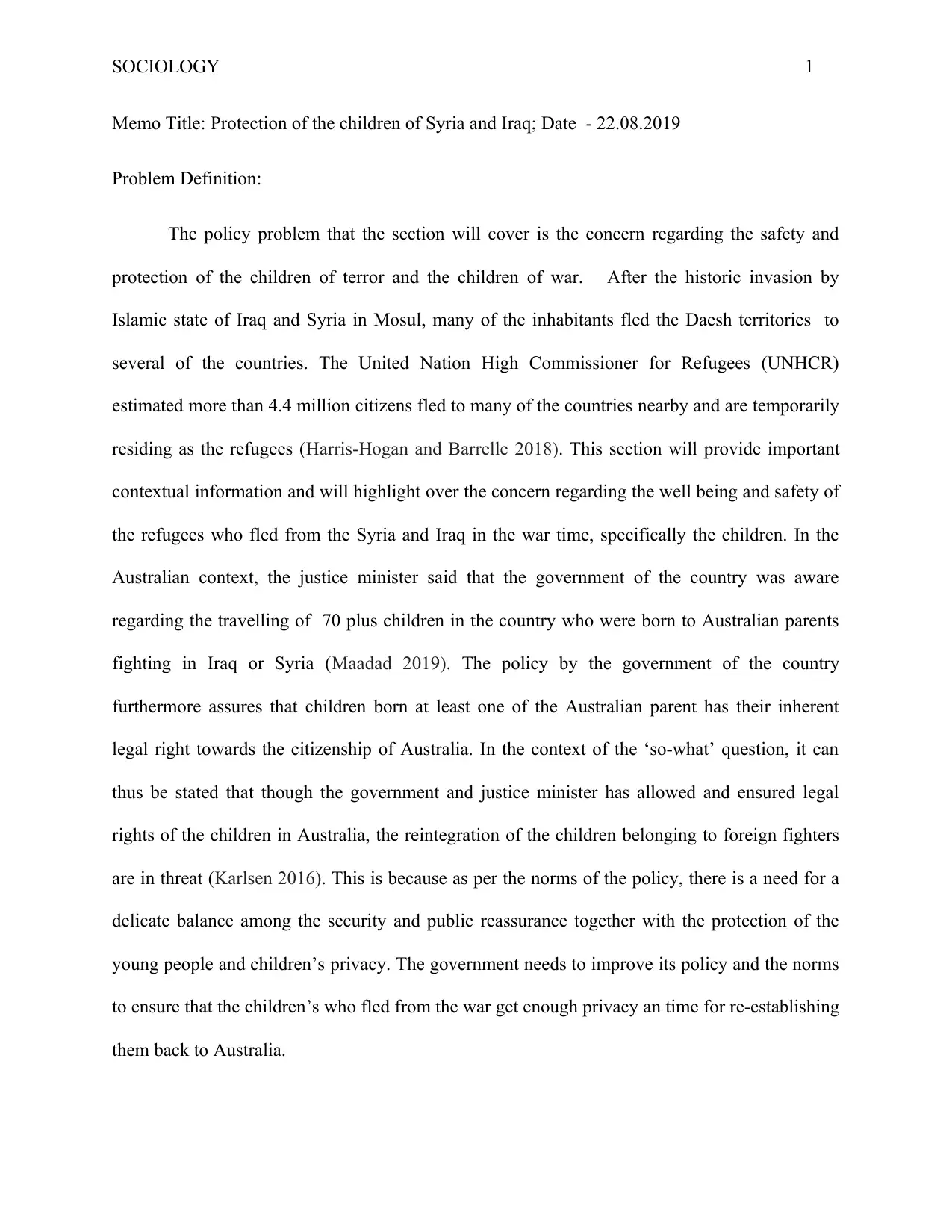
SOCIOLOGY 1
Memo Title: Protection of the children of Syria and Iraq; Date - 22.08.2019
Problem Definition:
The policy problem that the section will cover is the concern regarding the safety and
protection of the children of terror and the children of war. After the historic invasion by
Islamic state of Iraq and Syria in Mosul, many of the inhabitants fled the Daesh territories to
several of the countries. The United Nation High Commissioner for Refugees (UNHCR)
estimated more than 4.4 million citizens fled to many of the countries nearby and are temporarily
residing as the refugees (Harris-Hogan and Barrelle 2018). This section will provide important
contextual information and will highlight over the concern regarding the well being and safety of
the refugees who fled from the Syria and Iraq in the war time, specifically the children. In the
Australian context, the justice minister said that the government of the country was aware
regarding the travelling of 70 plus children in the country who were born to Australian parents
fighting in Iraq or Syria (Maadad 2019). The policy by the government of the country
furthermore assures that children born at least one of the Australian parent has their inherent
legal right towards the citizenship of Australia. In the context of the ‘so-what’ question, it can
thus be stated that though the government and justice minister has allowed and ensured legal
rights of the children in Australia, the reintegration of the children belonging to foreign fighters
are in threat (Karlsen 2016). This is because as per the norms of the policy, there is a need for a
delicate balance among the security and public reassurance together with the protection of the
young people and children’s privacy. The government needs to improve its policy and the norms
to ensure that the children’s who fled from the war get enough privacy an time for re-establishing
them back to Australia.
Memo Title: Protection of the children of Syria and Iraq; Date - 22.08.2019
Problem Definition:
The policy problem that the section will cover is the concern regarding the safety and
protection of the children of terror and the children of war. After the historic invasion by
Islamic state of Iraq and Syria in Mosul, many of the inhabitants fled the Daesh territories to
several of the countries. The United Nation High Commissioner for Refugees (UNHCR)
estimated more than 4.4 million citizens fled to many of the countries nearby and are temporarily
residing as the refugees (Harris-Hogan and Barrelle 2018). This section will provide important
contextual information and will highlight over the concern regarding the well being and safety of
the refugees who fled from the Syria and Iraq in the war time, specifically the children. In the
Australian context, the justice minister said that the government of the country was aware
regarding the travelling of 70 plus children in the country who were born to Australian parents
fighting in Iraq or Syria (Maadad 2019). The policy by the government of the country
furthermore assures that children born at least one of the Australian parent has their inherent
legal right towards the citizenship of Australia. In the context of the ‘so-what’ question, it can
thus be stated that though the government and justice minister has allowed and ensured legal
rights of the children in Australia, the reintegration of the children belonging to foreign fighters
are in threat (Karlsen 2016). This is because as per the norms of the policy, there is a need for a
delicate balance among the security and public reassurance together with the protection of the
young people and children’s privacy. The government needs to improve its policy and the norms
to ensure that the children’s who fled from the war get enough privacy an time for re-establishing
them back to Australia.
Paraphrase This Document
Need a fresh take? Get an instant paraphrase of this document with our AI Paraphraser
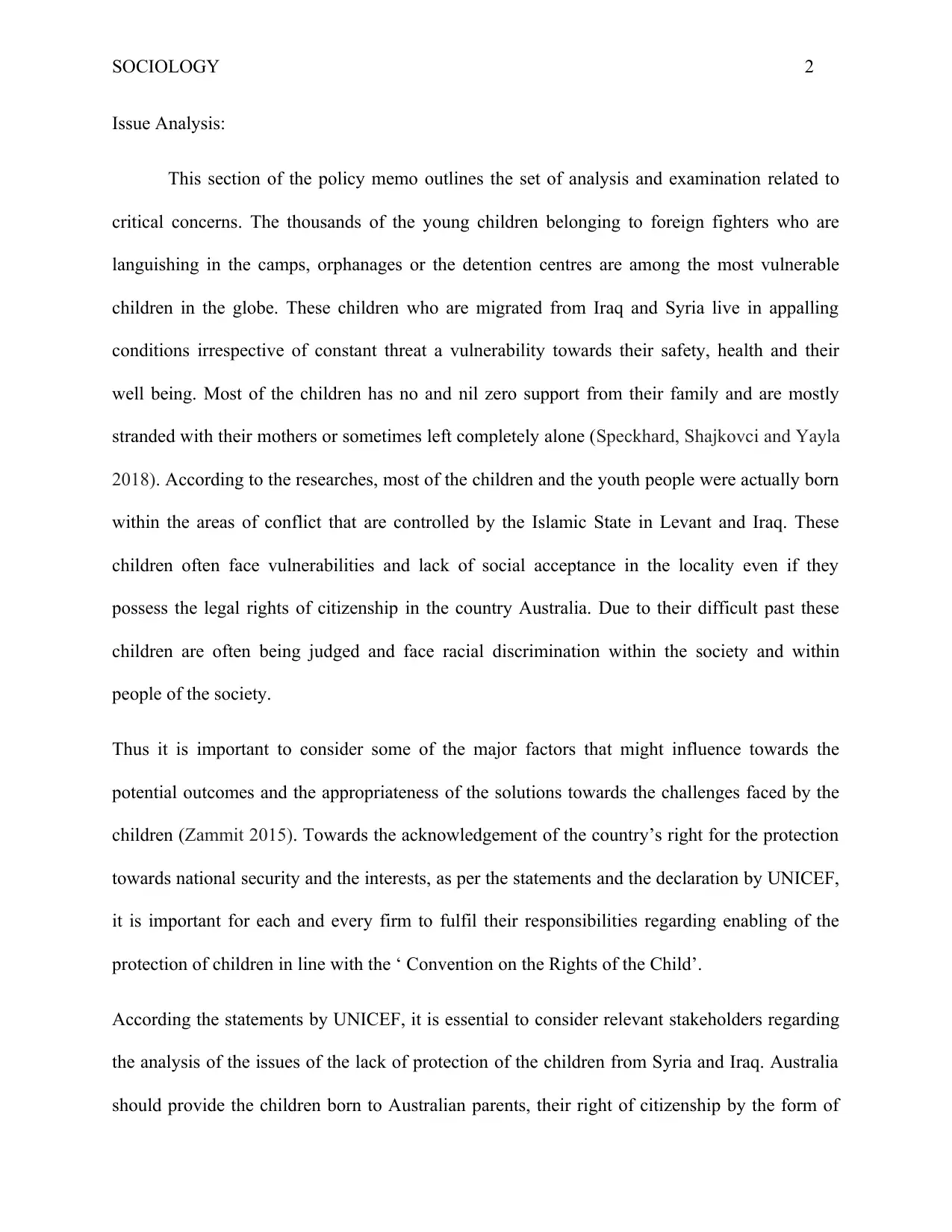
SOCIOLOGY 2
Issue Analysis:
This section of the policy memo outlines the set of analysis and examination related to
critical concerns. The thousands of the young children belonging to foreign fighters who are
languishing in the camps, orphanages or the detention centres are among the most vulnerable
children in the globe. These children who are migrated from Iraq and Syria live in appalling
conditions irrespective of constant threat a vulnerability towards their safety, health and their
well being. Most of the children has no and nil zero support from their family and are mostly
stranded with their mothers or sometimes left completely alone (Speckhard, Shajkovci and Yayla
2018). According to the researches, most of the children and the youth people were actually born
within the areas of conflict that are controlled by the Islamic State in Levant and Iraq. These
children often face vulnerabilities and lack of social acceptance in the locality even if they
possess the legal rights of citizenship in the country Australia. Due to their difficult past these
children are often being judged and face racial discrimination within the society and within
people of the society.
Thus it is important to consider some of the major factors that might influence towards the
potential outcomes and the appropriateness of the solutions towards the challenges faced by the
children (Zammit 2015). Towards the acknowledgement of the country’s right for the protection
towards national security and the interests, as per the statements and the declaration by UNICEF,
it is important for each and every firm to fulfil their responsibilities regarding enabling of the
protection of children in line with the ‘ Convention on the Rights of the Child’.
According the statements by UNICEF, it is essential to consider relevant stakeholders regarding
the analysis of the issues of the lack of protection of the children from Syria and Iraq. Australia
should provide the children born to Australian parents, their right of citizenship by the form of
Issue Analysis:
This section of the policy memo outlines the set of analysis and examination related to
critical concerns. The thousands of the young children belonging to foreign fighters who are
languishing in the camps, orphanages or the detention centres are among the most vulnerable
children in the globe. These children who are migrated from Iraq and Syria live in appalling
conditions irrespective of constant threat a vulnerability towards their safety, health and their
well being. Most of the children has no and nil zero support from their family and are mostly
stranded with their mothers or sometimes left completely alone (Speckhard, Shajkovci and Yayla
2018). According to the researches, most of the children and the youth people were actually born
within the areas of conflict that are controlled by the Islamic State in Levant and Iraq. These
children often face vulnerabilities and lack of social acceptance in the locality even if they
possess the legal rights of citizenship in the country Australia. Due to their difficult past these
children are often being judged and face racial discrimination within the society and within
people of the society.
Thus it is important to consider some of the major factors that might influence towards the
potential outcomes and the appropriateness of the solutions towards the challenges faced by the
children (Zammit 2015). Towards the acknowledgement of the country’s right for the protection
towards national security and the interests, as per the statements and the declaration by UNICEF,
it is important for each and every firm to fulfil their responsibilities regarding enabling of the
protection of children in line with the ‘ Convention on the Rights of the Child’.
According the statements by UNICEF, it is essential to consider relevant stakeholders regarding
the analysis of the issues of the lack of protection of the children from Syria and Iraq. Australia
should provide the children born to Australian parents, their right of citizenship by the form of
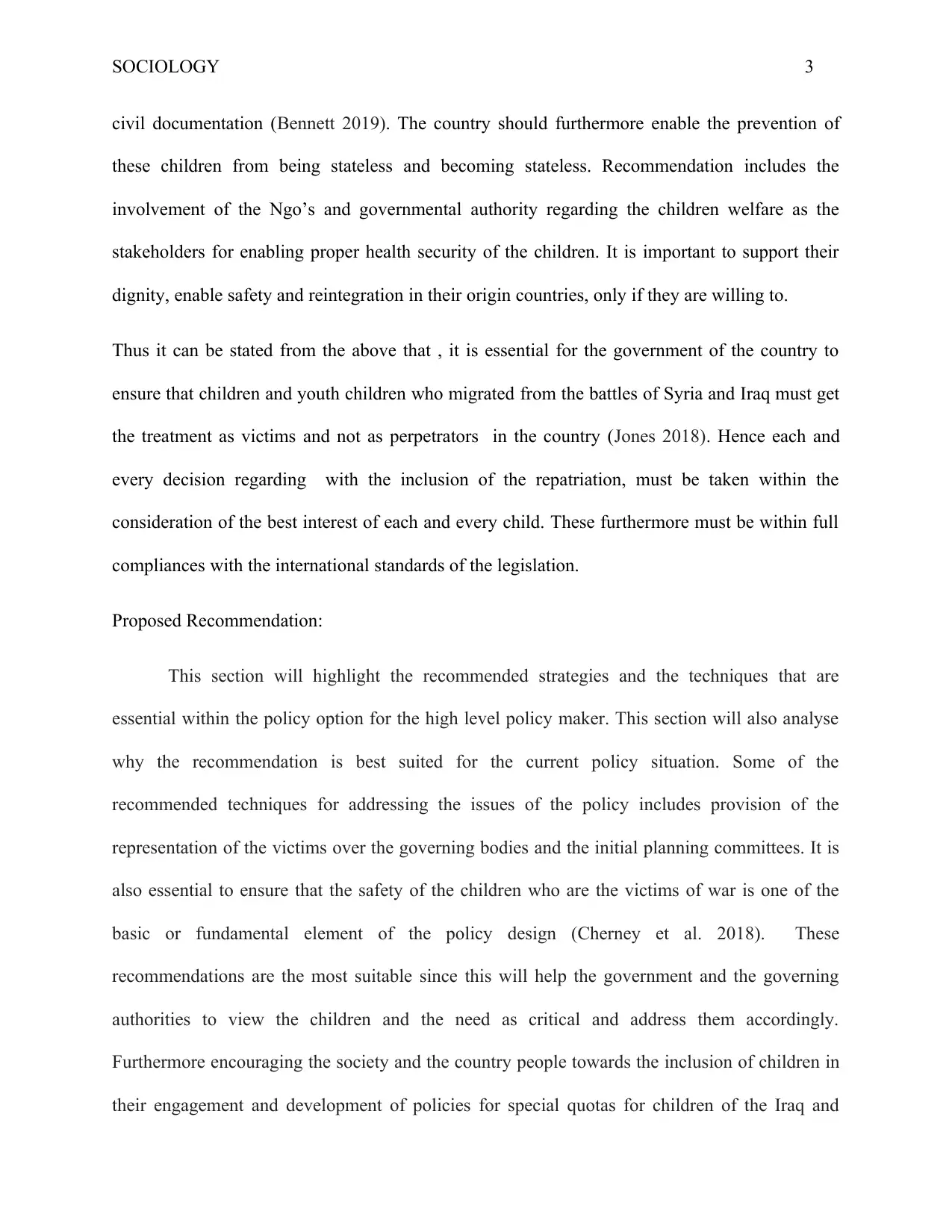
SOCIOLOGY 3
civil documentation (Bennett 2019). The country should furthermore enable the prevention of
these children from being stateless and becoming stateless. Recommendation includes the
involvement of the Ngo’s and governmental authority regarding the children welfare as the
stakeholders for enabling proper health security of the children. It is important to support their
dignity, enable safety and reintegration in their origin countries, only if they are willing to.
Thus it can be stated from the above that , it is essential for the government of the country to
ensure that children and youth children who migrated from the battles of Syria and Iraq must get
the treatment as victims and not as perpetrators in the country (Jones 2018). Hence each and
every decision regarding with the inclusion of the repatriation, must be taken within the
consideration of the best interest of each and every child. These furthermore must be within full
compliances with the international standards of the legislation.
Proposed Recommendation:
This section will highlight the recommended strategies and the techniques that are
essential within the policy option for the high level policy maker. This section will also analyse
why the recommendation is best suited for the current policy situation. Some of the
recommended techniques for addressing the issues of the policy includes provision of the
representation of the victims over the governing bodies and the initial planning committees. It is
also essential to ensure that the safety of the children who are the victims of war is one of the
basic or fundamental element of the policy design (Cherney et al. 2018). These
recommendations are the most suitable since this will help the government and the governing
authorities to view the children and the need as critical and address them accordingly.
Furthermore encouraging the society and the country people towards the inclusion of children in
their engagement and development of policies for special quotas for children of the Iraq and
civil documentation (Bennett 2019). The country should furthermore enable the prevention of
these children from being stateless and becoming stateless. Recommendation includes the
involvement of the Ngo’s and governmental authority regarding the children welfare as the
stakeholders for enabling proper health security of the children. It is important to support their
dignity, enable safety and reintegration in their origin countries, only if they are willing to.
Thus it can be stated from the above that , it is essential for the government of the country to
ensure that children and youth children who migrated from the battles of Syria and Iraq must get
the treatment as victims and not as perpetrators in the country (Jones 2018). Hence each and
every decision regarding with the inclusion of the repatriation, must be taken within the
consideration of the best interest of each and every child. These furthermore must be within full
compliances with the international standards of the legislation.
Proposed Recommendation:
This section will highlight the recommended strategies and the techniques that are
essential within the policy option for the high level policy maker. This section will also analyse
why the recommendation is best suited for the current policy situation. Some of the
recommended techniques for addressing the issues of the policy includes provision of the
representation of the victims over the governing bodies and the initial planning committees. It is
also essential to ensure that the safety of the children who are the victims of war is one of the
basic or fundamental element of the policy design (Cherney et al. 2018). These
recommendations are the most suitable since this will help the government and the governing
authorities to view the children and the need as critical and address them accordingly.
Furthermore encouraging the society and the country people towards the inclusion of children in
their engagement and development of policies for special quotas for children of the Iraq and
⊘ This is a preview!⊘
Do you want full access?
Subscribe today to unlock all pages.

Trusted by 1+ million students worldwide
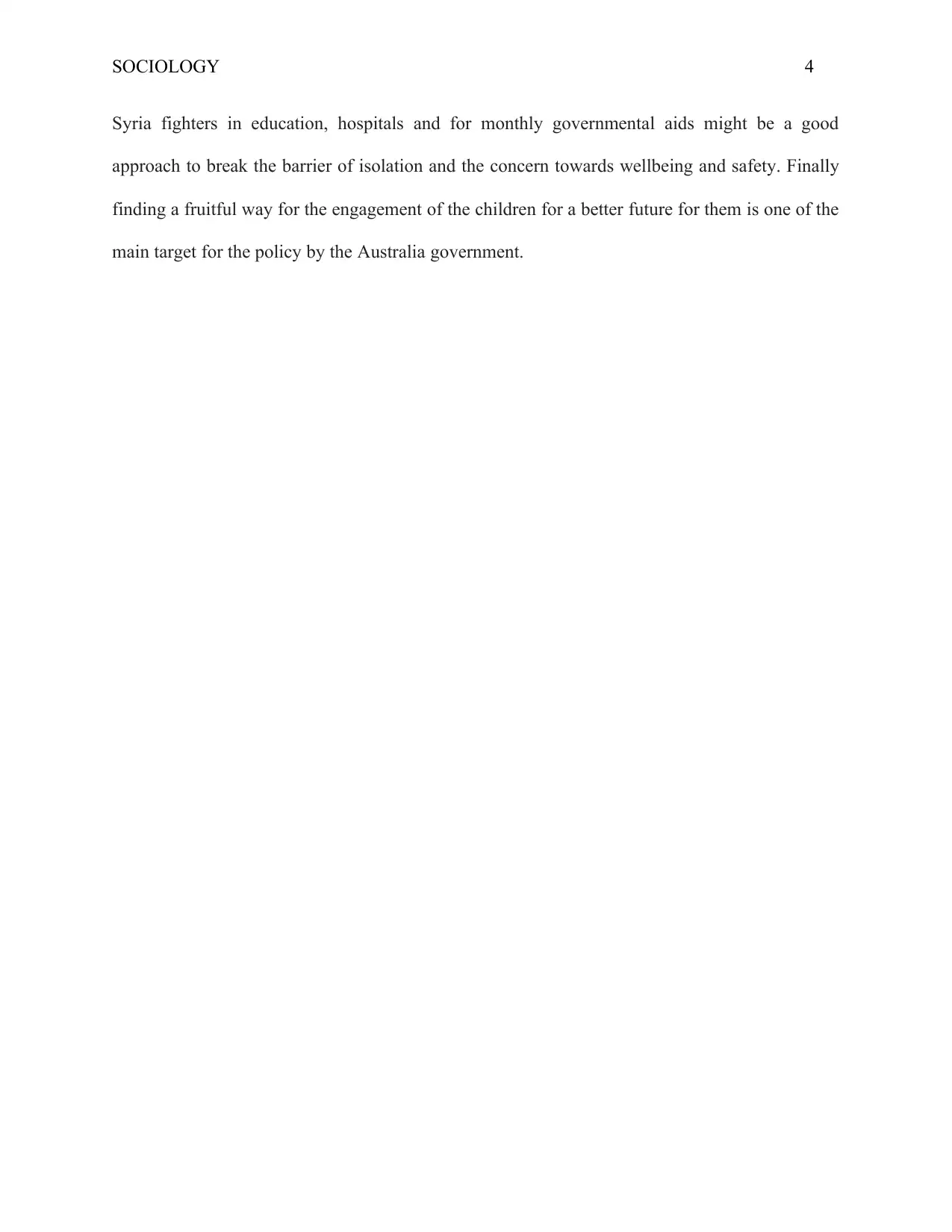
SOCIOLOGY 4
Syria fighters in education, hospitals and for monthly governmental aids might be a good
approach to break the barrier of isolation and the concern towards wellbeing and safety. Finally
finding a fruitful way for the engagement of the children for a better future for them is one of the
main target for the policy by the Australia government.
Syria fighters in education, hospitals and for monthly governmental aids might be a good
approach to break the barrier of isolation and the concern towards wellbeing and safety. Finally
finding a fruitful way for the engagement of the children for a better future for them is one of the
main target for the policy by the Australia government.
Paraphrase This Document
Need a fresh take? Get an instant paraphrase of this document with our AI Paraphraser
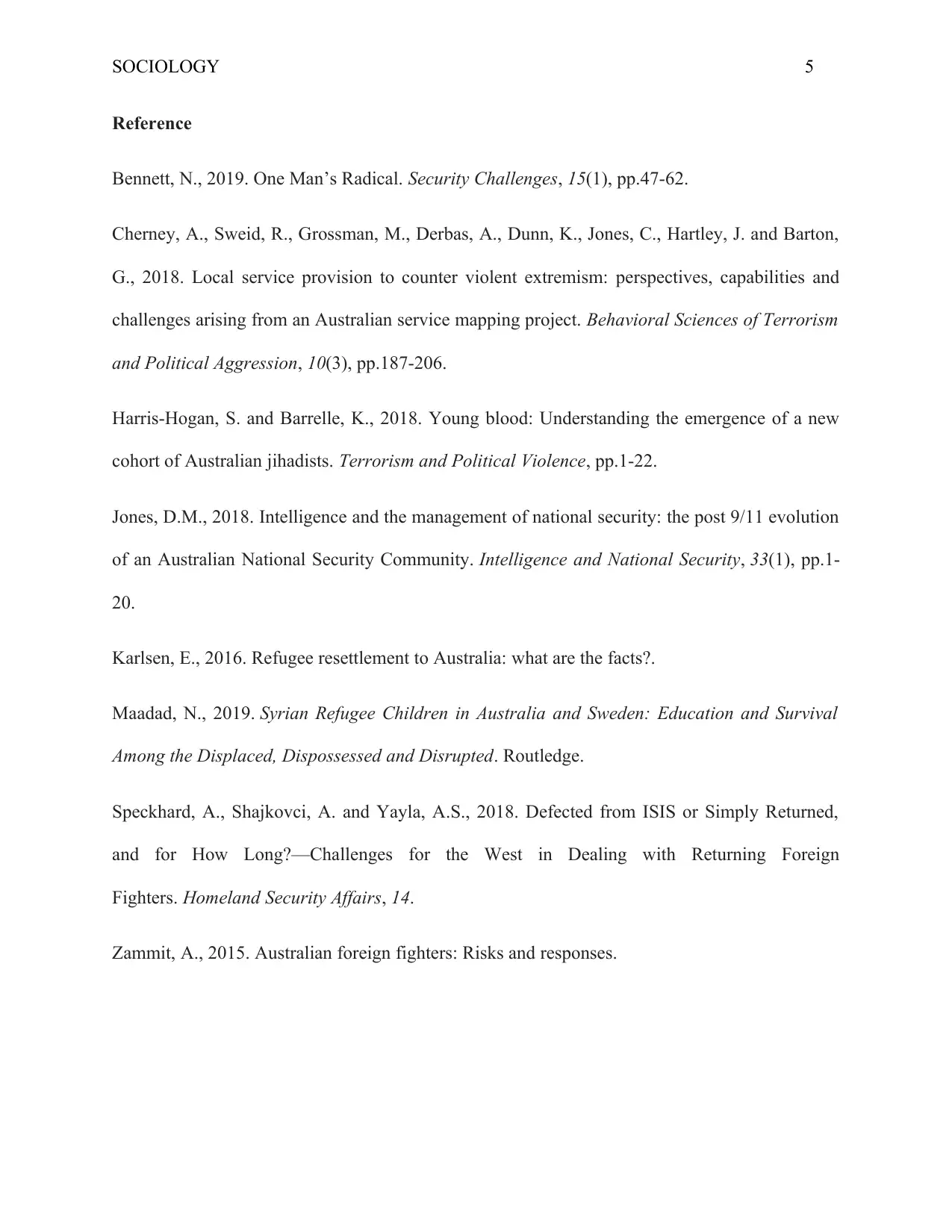
SOCIOLOGY 5
Reference
Bennett, N., 2019. One Man’s Radical. Security Challenges, 15(1), pp.47-62.
Cherney, A., Sweid, R., Grossman, M., Derbas, A., Dunn, K., Jones, C., Hartley, J. and Barton,
G., 2018. Local service provision to counter violent extremism: perspectives, capabilities and
challenges arising from an Australian service mapping project. Behavioral Sciences of Terrorism
and Political Aggression, 10(3), pp.187-206.
Harris-Hogan, S. and Barrelle, K., 2018. Young blood: Understanding the emergence of a new
cohort of Australian jihadists. Terrorism and Political Violence, pp.1-22.
Jones, D.M., 2018. Intelligence and the management of national security: the post 9/11 evolution
of an Australian National Security Community. Intelligence and National Security, 33(1), pp.1-
20.
Karlsen, E., 2016. Refugee resettlement to Australia: what are the facts?.
Maadad, N., 2019. Syrian Refugee Children in Australia and Sweden: Education and Survival
Among the Displaced, Dispossessed and Disrupted. Routledge.
Speckhard, A., Shajkovci, A. and Yayla, A.S., 2018. Defected from ISIS or Simply Returned,
and for How Long?—Challenges for the West in Dealing with Returning Foreign
Fighters. Homeland Security Affairs, 14.
Zammit, A., 2015. Australian foreign fighters: Risks and responses.
Reference
Bennett, N., 2019. One Man’s Radical. Security Challenges, 15(1), pp.47-62.
Cherney, A., Sweid, R., Grossman, M., Derbas, A., Dunn, K., Jones, C., Hartley, J. and Barton,
G., 2018. Local service provision to counter violent extremism: perspectives, capabilities and
challenges arising from an Australian service mapping project. Behavioral Sciences of Terrorism
and Political Aggression, 10(3), pp.187-206.
Harris-Hogan, S. and Barrelle, K., 2018. Young blood: Understanding the emergence of a new
cohort of Australian jihadists. Terrorism and Political Violence, pp.1-22.
Jones, D.M., 2018. Intelligence and the management of national security: the post 9/11 evolution
of an Australian National Security Community. Intelligence and National Security, 33(1), pp.1-
20.
Karlsen, E., 2016. Refugee resettlement to Australia: what are the facts?.
Maadad, N., 2019. Syrian Refugee Children in Australia and Sweden: Education and Survival
Among the Displaced, Dispossessed and Disrupted. Routledge.
Speckhard, A., Shajkovci, A. and Yayla, A.S., 2018. Defected from ISIS or Simply Returned,
and for How Long?—Challenges for the West in Dealing with Returning Foreign
Fighters. Homeland Security Affairs, 14.
Zammit, A., 2015. Australian foreign fighters: Risks and responses.
1 out of 5
Related Documents
Your All-in-One AI-Powered Toolkit for Academic Success.
+13062052269
info@desklib.com
Available 24*7 on WhatsApp / Email
![[object Object]](/_next/static/media/star-bottom.7253800d.svg)
Unlock your academic potential
Copyright © 2020–2026 A2Z Services. All Rights Reserved. Developed and managed by ZUCOL.





